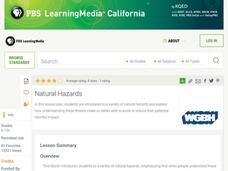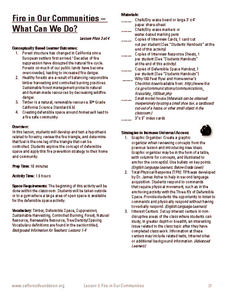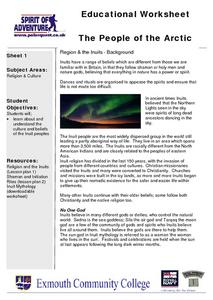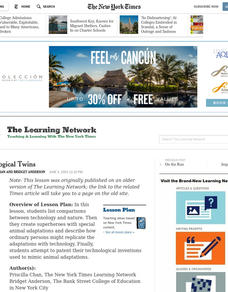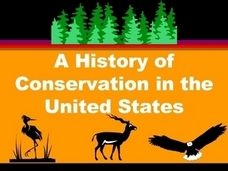Curated OER
Natural Hazards
Students use videos and maps as a springboard for a discussion in which they differentiate between natural disasters and natural hazards. They explore steps being taken to minimize the impact of hazards and disasters and create and...
Curated OER
Charles Darwin
Students produce a newspaper describing the times during which Charles Darwin introduced the theory of natural selection. In this evolution lesson, students make observations and explore the role of observation in Charles Darwin's work....
Curated OER
How Evolution Works
Young scholars work in groups to investigate and present genetic variation, adaptation, and sexual selection as it relates to evolution. In this evolution lesson, students watch a video discuss how the human eye could evolve due to...
Curated OER
Economic Use of Public Natural Areas
Students examine the public controversy between the use of public natural areas for economic activities by viewing video clips, researching on the Internet, and calculating sustainable land.
Curated OER
Rainforest Resources
Students explore products of the rainforest. In this environmental stewardship lesson plan, students discover the resources that the rainforest holds and examine products from the rainforest used around the world.
Curated OER
Natural Cleaners
Learners explore natural cleaners. In this science lesson plan, students gain an understanding of the effects that commercial cleaners have on the environment and teach them to make their own cleaners out of less hazardous materials.
Curated OER
Make Bark and Leaf Rubbings
Learners explore natural resources by creating art from plant materials. In this leaf rubbings instructional activity, students identify the plants that shed bark and leaves and discuss how it helps them survive in specific environments....
Forest Foundation
Fire in Our Communities - What Can We Do?
Learn about defensible space and renewable resources with a lesson plan about forest fires. After exploring the ways that humans have impacted the environment, kids conduct mock interviews about differing points of view in the...
Curated OER
Introduction To Economics
High schoolers examine the fundamental nature of economics - unlimited wants and scarce resources and the need to make choices, the three questions related to the economic problem and its implications for an economy. This lesson come...
Channel Islands Film
Once Upon a Time (Sa Hi Pa Ca): Lesson Plan 3
What was the most significant tool used by the Chumash? How did the environment make the tool possible? What group behaviors allowed the Chumash be be successful for thousands of years? After watching West of the West's documentary Once...
Curated OER
People of the Arctic
Read to learn all about the religion and belief systems of the Arctic-dwelling Inuits. This resource includes an easy-to-follow reading passage that is seven paragraphs in length, and five great critical thinking questions.
iCivics
Why Government?
Why do people create governments? Where did we get our ideas about government? This is a fantastic introductory instructional activity for your American government class that begins by reviewing the philosophies of Thomas Hobbes and John...
Cyberwise
Good Digital Citizenship Outdoors
It's easy to miss the beauty of nature when one's focus is on technology. Don't make that mistake with help from a two-page reference sheet that provides eight tips for staying present when exploring the world around you.
Curated OER
Exploring Homes and Resources
Students search for images of and information about the exchange country's environments and housing, using a variety of sources, and evaluate primary sources of information in terms of accuracy and usefulness.
Curated OER
Technological Twins
Students list comparisons between technology and nature. Then they create superheroes with special animal characteristics and describe how ordinary persons might replicate the changes with technology.
Curated OER
Exponential Reflections
High Schoolers explore the concept of exponential reflections. They use their Ti-Nspire to reflect the natural logarithm function over the line y=x. High schoolers repeat the process using different exponential functions using a slider.
Curated OER
A History of the Conservation in the United States
Any student interested in the natural resources should be engaged by this PowerPoint. It gives many details and examples of problems associated with resource management. The regulations and protocols established to help with the...
Alabama Wildlife Federation
Wildlife Habitat Checklist
Take a walk on the wild side with a project about animal habitats. After kids observe a chosen animal in its home, they describe the animal's food and water sources, shelter, and how it raises its young. They then write a short fictional...
It's About Time
Polymers
All plastics contain polymers, but not all polymers are plastic. Young chemists make their own polymer and compare the properties to those of other states of matter. After a reading passage, pupils answer analysis questions about natural...
Howard Hughes Medical Institute
Seed Dispersal in Tropical Forests
How do seeds get around? It's not like plants can control seed dispersal—or can they? Dig deeper into the amazing mechanisms of seed dispersal observed in tropical plants through interactives, a video, and plenty of hands-on data...
Montana State University
Climb into Action!
Climate change affects even the largest and intimidating of landforms—even Mount Everest! A resource helps teach learners the connection between global climate change and its effects on Earth. Activities include videos, class discussion,...
Curated OER
Soils
Students apply knowledge of soil, environmental impacts, economics, multiple human demands, and use given data for a proposed scenario in making land use decisions. They debate land use issues and/or scenarios and discuss a case study.
Social Studies School Service
Ancient China: Introduction, Map
What a great resource for introducing your youngsters to the world of ancient China and the earliest stages of its timeline. Included are creative ideas for organizing your room, as well as an engaging lesson, anticipatory set, and map...
It's About Time
What Drives the Plates?
It's getting hot in here! Lead your emerging geoscientists on a thrilling journey as they calculate liquid densities to determine forces that stimulate thermal plates from within the earth's crust. They explore effects of temperature on...


